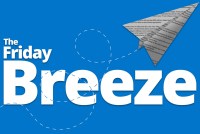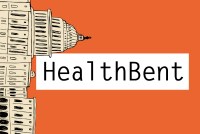Latest KFF Health News Stories
Must-Reads Of The Week From Brianna Labuskes
Newsletter editor Brianna Labuskes wades through hundreds of health care policy stories each week, so you don’t have to.
Insurers Sank Connecticut’s ‘Public Option.’ Would A National Version Survive?
Even in a solidly blue state where voters were demanding relief from high health care costs, the idea of a government-run public option for health insurance faced a “steam train of opposition.”
U.S. Medical Panel Thinks Twice About Pushing Cognitive Screening For Dementia
Because seniors are at higher risk of cognitive impairment, proponents say screening asymptomatic older adults is an important strategy to identify people who may be developing dementia and to improve their care. But the U.S. Preventive Services Task Force cited insufficient evidence the tests are helpful.
Needy Patients ‘Caught In The Middle’ As Insurance Titan Drops Doctors
UnitedHealthcare is dropping hundreds of physicians from its New Jersey Medicaid network, separating patients from longtime doctors. Physicians charge the insurer is using its market power to shift business to practices it controls.
Must-Reads Of The Week From Brianna Labuskes
Newsletter editor Brianna Labuskes wades through hundreds of health care policy stories each week, so you don’t have to.
Analysis: Who Profits From Steep Medical Bills? The People Tasked With Fixing Them.
Surprise bills are just the latest weapons in a decades-long war among health care industry players over who gets to keep the fortunes generated each year from patient illness: $3.6 trillion in 2018. The practice is an outrage, yet no one in the health care sector wants to unilaterally make the type of big concessions that would change things.
Must-Reads Of The Week From Brianna Labuskes
Happy Friday! In news that is technically really good and exciting but is also kind of icky: yarn made from human skin could eventually be used to stitch up surgical wounds as a way to cut down on detrimental reactions from patients. As CNN reports, “The researchers say their ‘human textile,’ which they developed from […]
Patients Stuck With Bills After Insurers Don’t Pay As Promised
Insurance companies often require patients to have medical procedures, devices, tests and even some medicines preapproved to ensure the insurers are willing to cover the costs. But that doesn’t guarantee they’ll end up paying. Some patients are getting stuck with unexpected bills after the medical service has been provided.
Patients Caught In Crossfire Between Giant Hospital Chain, Large Insurer
Insurance giant Cigna and San Francisco-based Dignity Health have failed to ink a 2020 contract, leaving nearly 17,000 patients in California and Nevada scrambling to find new health care providers. Meanwhile, Dignity faces financial and legal challenges while it strives to implement its merger with Catholic Health Initiatives, which created one of the nation’s largest Catholic hospital systems.
A Guide To Following The Health Debate In The 2020 Elections
As the Democratic primary campaign nears pivotal voting, important aspects of health care policy are being overlooked.
Elecciones 2020: guía para seguir el debate de salud
Precios, tipo de cobertura, formas de acceder a la atención, son algunos de los temas que ya están dominando el debate en este año electoral.
Appendicitis Is Painful — Add A $41,212 Surgery Bill To The Misery
A young man averted medical disaster after a friend took him to the nearest hospital just before his appendix burst. But more than a year later, he’s still facing a $28,000 balance bill for his out-of-network surgery.
Le cobran $41,212 por sacarle el apéndice
Nadie le dijo que el hospital estaba fuera de la red del plan médico que tenía a través de su trabajo. En cualquier caso, no hubiera podido irse a otro lugar. Su apéndice estaba a punto de reventar.
Call For FDA To Withdraw Preterm Birth Drug Divides Doctors and Insurers
A study ordered by the Food and Drug Administration failed to prove that Makena, the only drug approved to prevent premature birth, is effective. While a panel of experts has recommended withdrawing the drug’s approval, many doctors are wary.
Must-Reads Of The Week From Brianna Labuskes
Newsletter editor Brianna Labuskes wades through hundreds of health care policy stories each week, so you don’t have to.
Must-Reads Of The Week From Brianna Labuskes
Newsletter editor Brianna Labuskes wades through hundreds of health care policy stories each week, so you don’t have to.
Must-Reads Of The Week From Brianna Labuskes
Newsletter editor Brianna Labuskes wades through hundreds of health care policy stories each week, so you don’t have to.
Must-Reads Of The Week From Brianna Labuskes
Newsletter editor Brianna Labuskes wades through hundreds of health care policy stories each week, so you don’t have to.
Kaiser Permanente: atención de salud mental aún recibe críticas, a pesar de arreglos
Entrevistas con docenas de terapeutas, pacientes y expertos pintan un cuadro de mejoras superficiales, pero que no se traducen en una atención más efectiva y accesible.
Despite Quick Fixes, Kaiser Permanente Mental Health Care Still Lags
Interviews with dozens of Kaiser Permanente therapists, patients and industry experts reveal superficial changes that look good on paper but do not translate into more effective and accessible care.

















